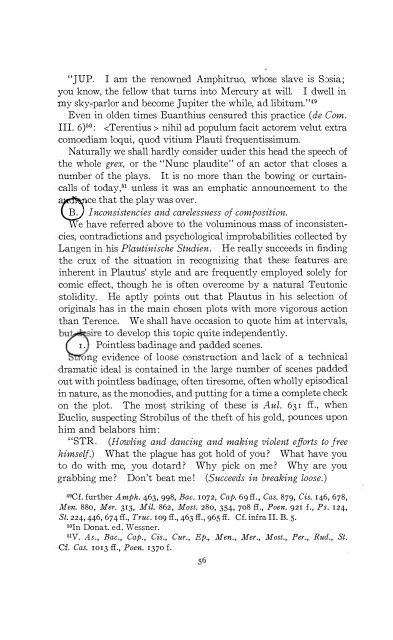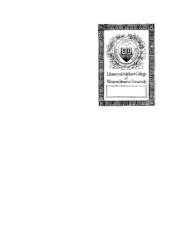You also want an ePaper? Increase the reach of your titles
YUMPU automatically turns print PDFs into web optimized ePapers that Google loves.
"JUP. I am the renowned Amphitruo, whose slave is S::>sia ;<br />
you know, the fellow that turns into Mercury at will. I dwell in<br />
my sky-parlor and become Jupiter the while, ad libitum. "49<br />
Even in olden times Euanthius censured this practice (de Com.<br />
III. 6)50 : nihil ad populum facit actorem velut extra<br />
comoediam loqui, quod vitium Plauti frequentissimum.<br />
Naturally we shall hardly consider under this head the speech of<br />
the whole grex, or the "Nunc plaudite" of an actor that closes a<br />
number of the plays. It is no more than the bowing or curtain<br />
calls of today,51 unless it was an emphatic announcement to the<br />
ce that the play was over.<br />
B. Inconsistencies and carelessness of composition.<br />
e have referred above to the voluminous mass of inconsisten<br />
cies, contradictions and psychological improbabilities collected by<br />
Langen in his Plautinische Studien. He really succeeds in finding<br />
the crux of the situation in recognizing that these features are<br />
inherent in Plautus' style and are frequently employed solely for<br />
comic effect, though he is often overcome by a natural Teutonic<br />
stolidity. He aptly points out that Plautus in his selection of<br />
originals has in the main chosen plots with more vigorous action<br />
than Terence. We shall have occasion to quote him at intervals,<br />
bUOire<br />
to develop this topic quite independently.<br />
I. Pointless badinage and padded scenes.<br />
ong evidence of loose c0nstruction and lack of a technical<br />
dramatic ideal is contained in the large number of scenes padded<br />
out with pointless badinage, often tiresome, often wholly episodical<br />
in nature, as the monodies, and putting for a time a complete check<br />
on the plot. The most striking of these is Au!' 63 1 ff., when<br />
Euclio, suspecting Strobilus of the theft of his gold, pounces upon<br />
him and belabors him :<br />
"STR. (Howling and dancing and making violent efforts to free<br />
himself.) What the plague has got hold of you ? What have you<br />
to do with me, you dotard ? Why pick on me ? Why are you<br />
grabbing me ? Don't beat me ! (Succeeds in breaking loose.)<br />
49Cf. further Amph. 463, 998, Bae. 1072, Cap. 69 ff., Cas. 879, Cis. 146, 678,<br />
Men. 880, Mer. 313, Mil. 862, Most. 280, 354, 708 ff., Poen. 921 f., Ps. 124,<br />
St. 224, 446, 674 ff., True. 109 ff., 463 ff. , 965 ff. Cf. infra II. B. 5·<br />
50In Donat. ed. Wessner.<br />
51V. As., Bae., Cap., Cis., Cur., Ep., Men., Mer., Most., Per., Rud., St.<br />
Cf. Cas. 1013 ff., Poen. 1370 f.
















